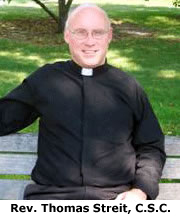
Rev. Thomas G. Streit, C.S.C., director of the University of Notre Dames Haiti Program, has been named to the inaugural class of ambassadors in the Paul G. Rogers Society for Global Health Research.
The class, which was selected by an advisory council that included three Nobel laureates, consists of 27 of the nations foremost experts in global health and represents a spectrum of the nationsscience advocates.
The Rogers Society is named for a formerFloridacongressman who is a renowned proponent of research to improve health. Research!America, an alliance for discoveries in health, launched the society to increase awareness of, and the make the case for greaterU.S.investment in, research to fight diseases that disproportionately affect the worlds poorest nations. The Rogers Society was established with funding from the Bill&Melinda Gates Foundation.
A 1980 graduate of Notre Dame, Father Streit received theological and pastoral training at Moreau Seminary, took final vows with the Congregation of Holy Cross in 1985, and was ordained in Sacred Heart Basilica in 1986. He was appointed rector of Morrissey Hall following ordination and served in that position for three years.
Father Streit earned a doctorate in biological sciences under the supervision of Notre Dame professors George Craig and Paul Grimstad and won a Young Investigator Award from the American Society of Tropical Medicine and Hygiene.
After earning his doctorate, he accepted a postdoctoral position with the Centers for Disease Control and Prevention (CDC). Posted toHaiti, he conducted research on the transmission and control of lymphatic filariasis (LF), a mosquito-borne infection that affects more than 120 million people throughout the tropics. He also helped establish, as the first full-time CDC staff director inHaiti, what is now an international reference center for LF at theHolyCrossHospitalin Leogane.
Based on research and community trials conducted inHaiti, the World Health Assembly in 1997 called for theeliminationof LF. More commonly known as elephantiasis, the condition joined four other global health problems now slated for eradication.
Father Streit joined the Notre Dame faculty in 1997 as an assistant research professor of biological sciences and established the Universitys Haiti Program, an initiative at the forefront of a global alliance of partners collaborating to reach the goal of eliminating LF.
Due in large part to the success of the Haiti Program, the Gates Foundation awarded Notre Dame a $5.2 million grant in 1999 to develop a model program for the global elimination of filariasis. More than 2.5 million treatments for filariasis and associated conditions have been delivered by the Haiti Program thus far, and the country is on track toward the historic goal of eliminating LF by 2013.
TopicID: 20242